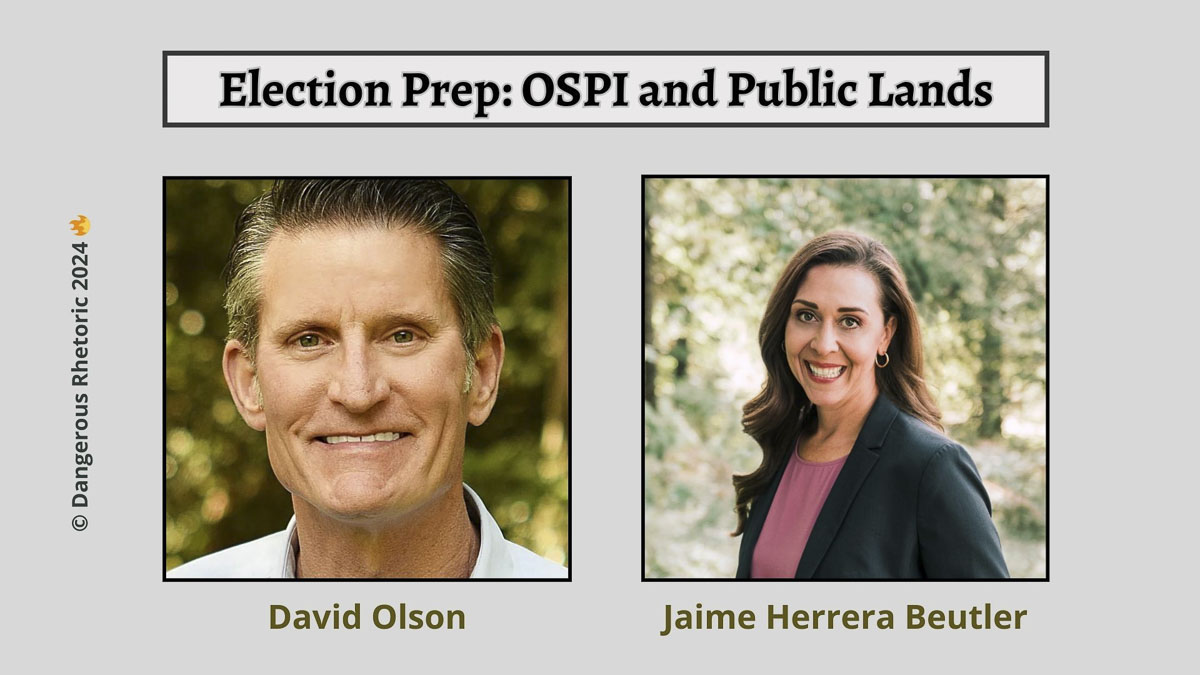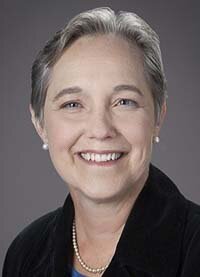
Three weeks until November general election ballots arrive
Nancy Churchill
Dangerous Rhetoric
In Washington’s vote-by-mail system, ballots for the 2024 general election will be mailed out starting on Oct. 18, with the voting period running until Nov. 5. This article will focus on two more key races: the state executive offices of Superintendent of Public Instruction and Commissioner of Public Lands.

These positions play a critical role in shaping our state’s future. The superintendent oversees K-12 public education, and the commissioner manages the state’s vast public lands. If well-educated children and well-managed forests are important to you, consider voting for these Republican candidates.
What is the job of the Superintendent of Public Instruction?
The Superintendent of Public Instruction in Washington state oversees K-12 public education. This role involves setting academic standards, managing the state education budget, and ensuring compliance with both state and federal education laws. The superintendent also provides guidance to school districts on curriculum, teacher certification and student assessment practices. Additionally, he or she advocates for education policies, aiming to improve equity and student outcomes across all districts. By working with state lawmakers and local schools, the superintendent ensures Washington’s education system meets the needs of all students.
David Olson: A conservative vision for Washington’s education
David Olson, a retired U.S. Navy chief warrant officer and a longtime member of the Peninsula School District board, is running for Superintendent of Public Instruction in Washington state. Endorsed by the Republican Party, Olson is running on a platform of educational reform aimed at increasing parental control, refocusing on core academics, and ensuring financial transparency.
Olson’s primary focus is on returning control to local school boards. He believes parents and local communities should have the authority to shape school policies, including curriculum choices, rather than state bureaucrats. He emphasizes that the role of the state should be to provide resources and frameworks, but decisions should remain with those closest to the students, aligning with his commitment to local control.
Olson is also critical of current OSPI policies, arguing that the state has failed to fully fund special education and to support districts post-COVID. He is calling for audits of OSPI’s financial practices to ensure that funding is appropriately allocated, especially for programs like special education, which he feels have been neglected.
Olson’s classroom reform initiatives include a strong stance on reducing distractions. For instance, he supports limiting cellphone and social media use during school hours to improve focus and mental health. He argues that removing these distractions can have a positive impact on academic performance and student well-being, citing successful implementations of such policies in his own district.
Other classroom initiatives include supporting struggling students by providing additional resources and tutoring. He also supports highly capable programs and rigorous academic opportunities for high achievers. Additionally, Olson seeks to expand vocational and skilled trades programs that prepare students for diverse, high-paying careers.
Another critical issue in Olson’s platform is addressing chronic absenteeism and its ties to mental health and poverty. He calls for a more integrated approach to tackle these issues, suggesting partnerships between schools, parents, and communities to provide the support students need to stay engaged. His candidacy offers a conservative alternative to the current state administration, appealing to voters who are frustrated with what they see as overreach by state officials and seek a return to locally driven, parent-empowered education.
What is the job of the Commissioner of Public Lands?
The Washington Commissioner of Public Lands manages state-owned lands, overseeing 5.6 million acres of forest, agricultural, and aquatic lands. His or her responsibilities include regulating logging, protecting forests from wildfires and ensuring sustainable land use practices. The commissioner also manages the Department of Natural Resources (DNR), which monitors land health and generates revenue for public schools and other services through responsible land use.
Jaime Herrera Beutler: A balanced approach to lands management
Former U.S. Representative Jaime Herrera Beutler is leveraging her extensive experience in Congress as she runs for Washington’s Commissioner of Public Lands in the 2024 election. With a deep connection to the state’s natural beauty and a common-sense understanding of environmental and public lands issues, Herrera Beutler is offering voters a balanced approach to land management that prioritizes both conservation and economic growth.
Her campaign focuses on wildfire prevention, forest management, and balancing conservation with economic growth. She advocates for active forest management, including thinning overgrown forests and removing diseased trees to reduce the risk of catastrophic wildfires.
Herrera Beutler also has a strong track record on environmental issues from her time in Congress, where she supported bipartisan legislation to protect endangered species like salmon, enhance wildfire suppression capabilities and maintain the state’s critical forest roads. While conservation is important to Herrera Beutler, she also stresses the importance of ensuring public lands remain accessible for logging, recreation and other economic activities that sustain rural Washington.
Having grown up in rural Washington, she prioritizes maintaining public access to natural resources and creating jobs in rural areas. Herrera Beutler emphasizes that Washington’s public lands should support local economies through industries like logging and recreation, while still being preserved for future generations. Overall, her platform offers a sensible balance of land stewardship and economic opportunity. Jamie is a great choice for lands commissioner.
Nancy Churchill is a writer and educator in rural eastern Washington State, and the state committeewoman for the Ferry County Republican Party. She may be reached at DangerousRhetoric@pm.me. The opinions expressed in Dangerous Rhetoric are her own. Dangerous Rhetoric is available on thinkspot, Rumble and Substack.
SOURCES:
(1) Office of Superintendent of Public Instruction, https://bit.ly/3TMOABo
(2) ParentMap, https://bit.ly/4dohA9z
(3) David Olson campaign website, https://bit.ly/3Y2cnje
(4) Shift WA, https://bit.ly/3Y4dMWL
(5) DNR, https://bit.ly/3ZKNauV
(6) Jaime Herrera Beutler campaign website, https://bit.ly/47QG7D1
Also read:
- Rep. Stephanie McClintock to hold town halls in Vancouver, Battle GroundRep. Stephanie McClintock will hold town halls in Vancouver and Battle Ground to preview the 2025 legislative session and address constituent concerns.
- Rep. Peter Abbarno elected House Republican Caucus Chair; committee assignments announcedRep. Peter Abbarno was elected House Republican Caucus Chair and appointed to key committees for the 2025 session.
- Opinion: Get ready for the 2025 legislative sessionNancy Churchill emphasizes the importance of citizen participation as the 2025 Washington legislative session begins.
- Opinion: Thousands of Republicans didn’t vote. Why?Amboy resident Thomas Schenk discusses low Republican voter turnout and election concerns in Clark County.
- Bipartisan bill seeks $100 million for Washington law enforcement hiringA bipartisan bill proposes $100 million to address police staffing shortages and public safety in Washington.










